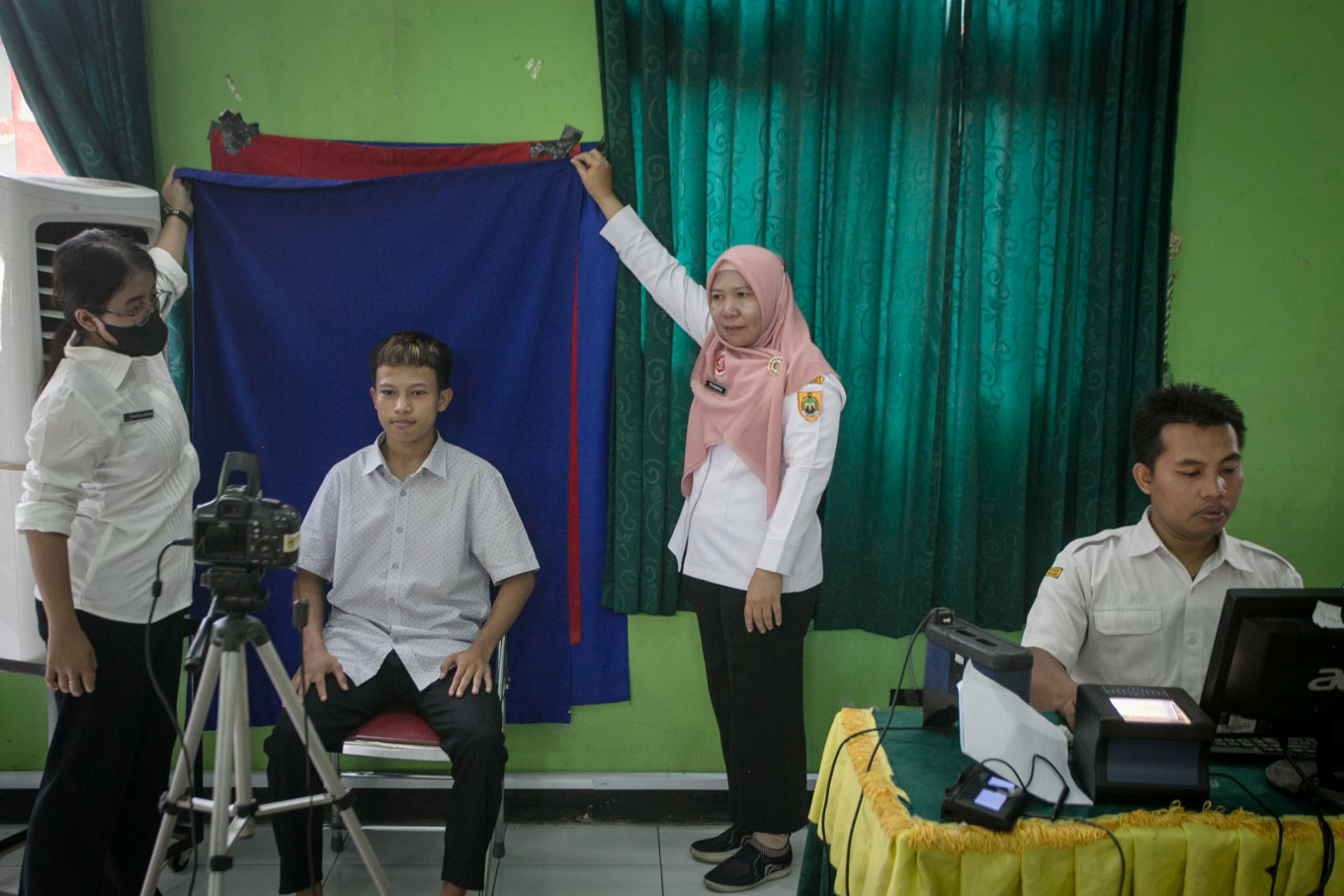Popular Reads
Top Results
Can't find what you're looking for?
View all search resultsPopular Reads
Top Results
Can't find what you're looking for?
View all search results‘Apathetic’ youth make up majority of voters
Over half of registered voters live on Java, influencing rosters.
Change text size
Gift Premium Articles
to Anyone

With people aged 40 and under expected to make up the majority of voters in the 2024 general elections, political parties and presidential hopefuls alike cannot spare any expense in making themselves appealing to a demographic already apathetic about politics, experts have said.
In about three months’ time, registration will open for would-be participants in next year’s grand celebration of democracy, with politicians vying for a place in the legislature and to form the next Indonesian government.
The candidates will have to rely on the votes of a burgeoning younger population, according to the finalized national voter roll that the General Elections Commission (KPU) painstakingly verified and announced on Sunday.
During its plenary, the KPU presented the final list of voters for the 2024 simultaneous elections, following a lengthy verification process that involved hundreds of regional KPU employees, Kompas daily reported.
The election body has recorded 204 million eligible voters, including 1.7 million Indonesians living abroad, who can participate in next year’s race, a roughly 12 million increase compared with the figure for the 2019 elections.
A closer look at the voter roll shows that 106 million of these voters, or around 52 percent of the total, are people younger than 40. When categorized by generation, a third of all registered voters are millennials, which officially refers to those born from the early 1980s until the late 1990s, while a further 22 percent belong to Generation Z, or those born in the late 1990s and onward.

With youth confirmed to make up the majority of voters, political parties are beginning to draw up their strategies to compete for the attention of these younger age groups, which observers insist will be a key factor in the successful bid of any presidential hopeful.
The United Development Party (PPP), for instance, has put its faith in recent inductee Sandiaga Uno, who has mass appeal on various social media platforms. Sandi, who now heads his new party’s election committee, held on Monday a three-day training course for the PPP’s rank and file with a primary focus on targeting young voters.
Similarly, the Golkar Party has recruited and appointed the popular and social media-savvy West Java Governor Ridwan Kamil as cochair of the party electoral committee, if only as a means to boost its standing with youth.
Campaign fodder
Noory Okhtariza, a researcher at the Jakarta-based Centre for Strategic and International Studies (CSIS) think tank, posited that making presidential candidates more relatable to millennials will be an important aspect in any successful presidential campaign.
“It could be their style of dress, speaking or even hobbies, but [presidential candidates] will all want to present themself as casually as possible in an effort to appeal to millennials,” Noory said on Monday.
Observers only need to point to presidential nominee Ganjar Pranowo’s impromptu appearance last month at M Bloc Space in South Jakarta, a popular hangout spot for the capital’s youth. The Indonesian Democratic Party of Struggle (PDI-P) politician was pictured conversing with young people as he made his way through the compound, complete with numerous photo ops.
Senior Gerindra Party politician Sufmi Dasco Ahmad was also quoted as saying on Monday that appealing to first-time voters would be one of the core programs of the party’s campaign platform for chairman Prabowo Subianto, Gerindra’s presumptive presidential candidate.
The shift to a more casual approach, Noory said, might also result in presidential hopefuls having debates in more casual settings, including on campuses or on online social media podcasts, rather than KPU-sanctioned events, which was the norm in previous elections.
“I think young voters might find a [KPU-sanctioned] debate to be too rigid,” Noory said. “And with the rise of political content [on social media], particularly podcasts, I think that’s where presidential candidates will try to come in with their more casual [form of campaigning].”
This, he said, would help incentivize younger voters to participate, particularly since an August survey by the CSIS, which polled respondents aged 17 to 39, revealed that signs of discontent about the political system are growing among some young people.
The survey found that nearly a fifth of respondents believe that democracy does not change anything, up from 10 percent when a similar question was polled in 2018 ahead of the presidential elections.
Still Java-centric
Aside from the focus on young voters, political observers say that presidential hopefuls will also focus their campaigns on appealing to voters from Java, as the KPU’s national voter roll showed that the island’s six provinces alone make up 56 percent of all voters nationwide.
West Java is still the biggest contributor to national voters with 35 million people, while East Java and Central Java trail closely in second and third with 31 million and 28 million voters, respectively.
The Java-centric population, according to political analyst Firman Noor of the National Research and Innovation Agency (BRIN), will even likely influence the vice-presidential pairings, as parties will look to match their presidential hopefuls with those who have broader appeal among voters in Java.
"Since the election is about winning the most votes, of course presidential hopefuls will focus on Java and pick their running mates [accordingly],” Firman said on Monday. “The running mates don't have to be Javanese in ethnicity, but they need to be popular among voters in Java.”










